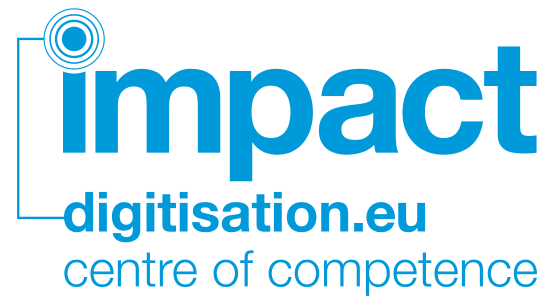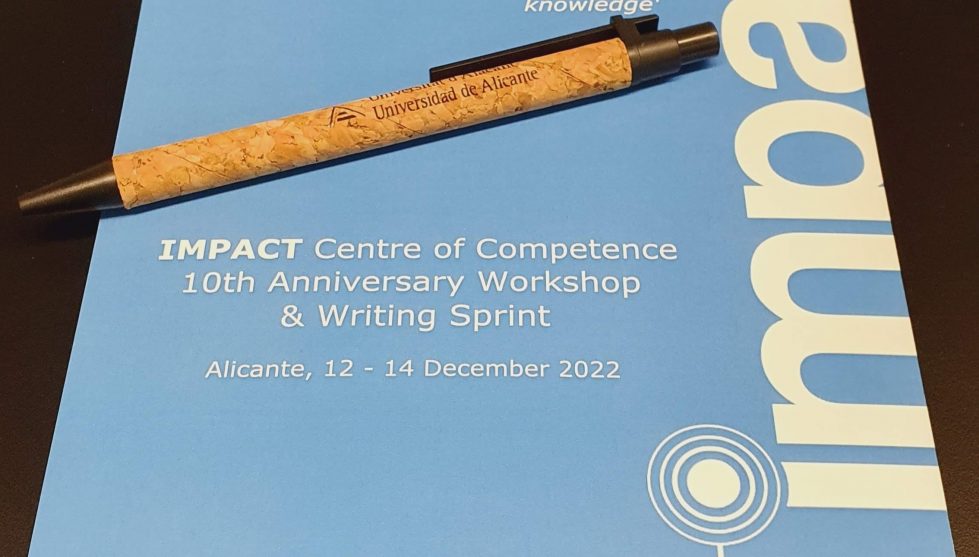On 12th December 2012, the IMPACT Centre of Competence, built upon the results of the namesake FP7-funded project, was officially launched. The initial aim of IMPACT was to “make digitisation better, faster and cheaper” and, during these 10 years, IMPACT has been providing support to institutions, researchers and individuals in their digitisation programmes, facilitating the active engagement with the network and fostering the sharing of best practice.
In order to celebrate the 10th Anniversary of IMPACT, the University of Alicante hosted on 12-14 December, 2022 a birthday workshop and writing sprint with the aim of creating a collaborative white paper entitled Sharing and Sustaining Digitisation Knowledge and with focus on the main challenges faced by researchers and practitioners of the main stakeholders groups of IMPACT: Computer Scientists, (Digital) Humanists and Cultural Heritage Institutions.
The workshop was organised by IMPACT’s Director and member of DARIAH-EU Board of Directors, Sally Chambers, and Gustavo Candela, researcher and developer at the Biblioteca Virtual Miguel de Cervantes (University of Alicante), both supported by key members of IMPACT such as Apostolos Antonacopoulos (PRImA research group at the University of Salford), Katrien Depuydt (Instituut voor de Nederlandse Taal), Minna Kaukonen (National Library of Finland), Mirjam Cuper (Koninklijke Bibliotheek), Rossitza Atanassova (the British Library) and Tomasz Parkola (Poznan Supercomputing and Networking Centre).
Over 20 expert participants across Europe and overseas met in Alicante: C. Annemieke Romein (Huygens Institute for History and Culture of the Netherlands), Carmen Morlon (IMPACT Centre of Competence), Christy Henshaw (Wellcome Collection), Dr Ines Vodopivec (National and University Library of Slovenia), Eeva Johanna Lilja (National Library of Finland), Filip Dobranić (Institute of Contemporary History, Ljubljana), Isabel Martínez-Sempere (IMPACT and University of Alicante), Jose Antonio Ortega Gilabert (University of Alicante), Katrine Gasser (Royal Danish Library), Mikel Iruskieta (University of the Basque Country), Milena Dobreva (Sofia University St Kliment Ohridski), Neil Fitzgerald (The British Library), Nele Gabriels (KU Leuven), Sébastien Cretin (Bibliothèque nationale de France), Tom Derrick (The British Library) and Yasmeen Shorish (James Madison University).
The experts divided into 4 working groups focused on relevant topics in the digitisation field:
- Digitisation Quality and Standards,
- Datafication of Digitised Cultural Heritage,
- Digitisation Workflows and Tools and
- Digitisation Community Engagement.
During the first session, experts identified the main challenges faced in each topic, which were voted afterwards in a plenary session, resulting in the following 6th most relevant topics:
- Standardisation of metadata: documentation and description of datasets
- Interoperability and Tool Selection (Tools are Fit for Purpose)
- Lack of Standardisation: Measuring quality per resource type
- Transparency: Documenting and Describing Processes
- Quality Depends on Users (What users need)
- Maintenance of Workflows and Tools
After the brainstorming session, it was time to celebrate the IMPACT Anniversary. The event was welcomed by Rafael Molina, Vice-rector for Digital Transformation, who highlighted the importance of IMPACT at the University of Alicante; Jesús Pradells, Director of the Biblioteca Virtual Miguel de Cervantes; Manuel Marco, Deputy Director of the Biblioteca Virtual Miguel de Cervantes; and Neil Fitzgerald, Head of Digital Research at The British Library and representing the IMPACT Executive Board.
The welcoming session was followed by a keynote panel in which Apostolos Antonacopoulos, Ines Vodopivec, Milena Dobreva and Neil Fitzgerald presented the main achievements of their institutions in digitisation during the past 10 years and the plans for the upcoming years. A cocktail was offered by IMPACT to close the Birthday Celebration.
The second day started with a short discussion on the challenges selected during the first session. Following this discussion, a series of lightning talks introduced the second writing sprint session. These talks were delivered by:
- Mirjam Cuper, National Library of the Netherlands: Examining a Multi- Layered Approach for Classification of OCR Quality without Ground Truth
- Mikel Iruskieta, University of the Basque Country: Handwritten Text Recognition and Basque exam papers
- Johanna Lilja on behalf of Liisa Näpärä, National Library of Finland: Designing Services for Researchers: a Finnish Case Study
- Sébastien Cretin, Bibliothèque nationale de France: How the BnF organises and eases access to its digital collection
- Nele Gabriëls, KU Leuven Libraries: Towards implementing Collections as Data in GLAM Institutions: a Survey
- Yasmeen Shorish, JMU Libraries: Collections as Data: an international perspective
- Annemieke Romein, Huygens ING: Community Building with Transkribus: the Dutch Language exemplar
After these inspirational talks, the participating experts divided into groups again and started to write the first draft of the white paper working on the theme definition, the key challenges, the state of the field, etc.
Following a light lunch, Gustavo Candela guided the participants in a visit through Biblioteca Virtual Miguel de Cervantes headquarters, where his colleagues showed the tasks and editions they are currently developing, before coming back to the writing sessions.
The third day of the workshop was devoted to the editorial team to clean up the document and put all things discussed in the previous days together.
We are looking forward to seeing the resulting White paper of this wonderful workshop!

